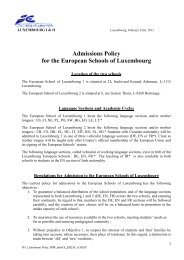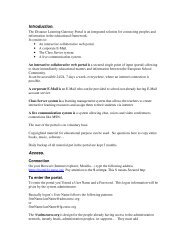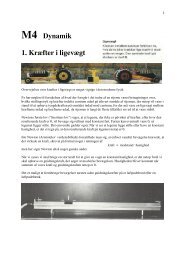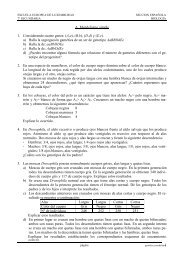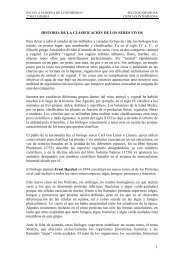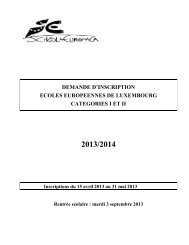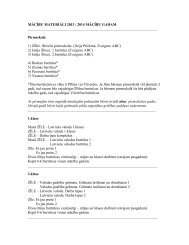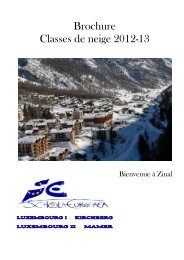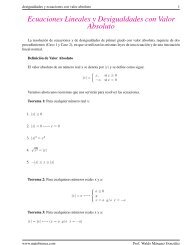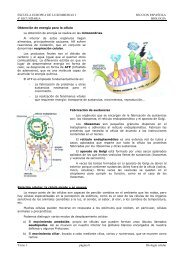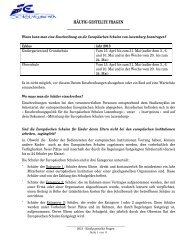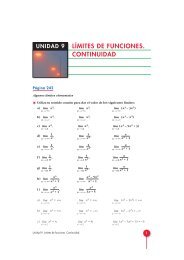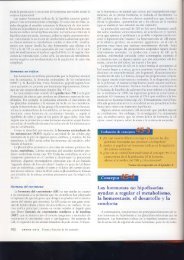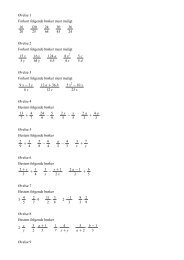European School - Ecole Européenne de Luxembourg I
European School - Ecole Européenne de Luxembourg I
European School - Ecole Européenne de Luxembourg I
You also want an ePaper? Increase the reach of your titles
YUMPU automatically turns print PDFs into web optimized ePapers that Google loves.
<strong>Luxembourg</strong> I<br />
<strong>Luxembourg</strong>, September, 2012<br />
Réf :2012/1550-RA/md4<br />
RULES FOR THE SECONDARY SCHOOL<br />
1-The school day<br />
1- 1- Timetable<br />
Bell 08.40<br />
1 st lesson 08.45 - 09.30<br />
2 nd lesson 09.35 - 10.20<br />
3 rd lesson 10.25 - 11.10<br />
Break 11.10 - 11.25<br />
4 th lesson 11.30 - 12.15<br />
5 th lesson 12.20 - 13.00<br />
Break 13.00 - 13.10<br />
6 th lesson 13.15 - 14.00<br />
7 th lesson 14.05 - 14.50<br />
8 th lesson 14.55 - 15.40<br />
9 th lesson 15.45 - 16.25.<br />
The end of one lesson and the start of the pause is signalled by a first bell. The following lesson starts on the second bell; a<br />
pupil who is not in the classroom at this moment is consi<strong>de</strong>red late.<br />
Each pupil is allowed a free period (5 th or 6 th ) which allows him or her to go to the canteen.<br />
1-2- Late arrivals<br />
a) A pupil who is late because of school transport must present the written justification, issued by a person<br />
responsible, to the teacher. (up until 09.00)<br />
b) For other late arrivals the pupil must:<br />
i) obtain a “late slip” which will be given by a counsellor up until 09.30 in room C007, E009 or at the<br />
entrance of the T building. This slip must be presented to the teacher on arrival in the classroom.<br />
ii) and present an excuse written by parents as soon as possible.<br />
c) All late arrivals will be recor<strong>de</strong>d in a file. Two non-justified late arrivals may be punished (see article 43).<br />
1-3- Opening times of buildings<br />
Access to the school is possible through:<br />
• The main entrance from 8.00 onwards.<br />
• The gate to the bus bays, opened upon arrival of the buses (approx. 8.15) until 8.45. This gate is then opened<br />
and closed according to the timetable of Sport lessons that take place in “La Coque”.<br />
• The gate between the Kin<strong>de</strong>rgarten and the playground of the secondary school, opened from 8.15 until the<br />
first bell (8.40). This access is reserved exclusively for pupils and authorized members of staff.<br />
Exit from the school is possible through:<br />
• The main exit.<br />
• The gate to the bus bays when the buses leave<br />
Pupils may enter the buildings as from 08.00. They can go to room E009 (supervised study), B002 (free study) or to the<br />
library as from 08.00. Access to upper floors is forbid<strong>de</strong>n until 08.35 except for pupils who have lockers there. Pupils may<br />
remain in the “common room” until 16.45.<br />
23, bd. Konrad A<strong>de</strong>nauer télécopie: Direction/Administration/<strong>Ecole</strong> secondaire : 43 20 82-344<br />
L-1115 <strong>Luxembourg</strong>-Kirchberg <strong>Ecole</strong> maternelle & primaire : 43 20 82-208<br />
Téléphone: 43 20 82-1<br />
1
1-4- Free periods<br />
During free periods or in the case of the absence of a teacher who cannot be replaced,<br />
− pupils in years 1, 2 and 3 go to room C007<br />
− pupils in years 4 and 5 go either to room E009 (supervised study), or to the library, or to room B002 or to the<br />
cafeteria.<br />
− pupils in years 6 and 7 go to room B002, or to the library, or to E009 or to B012, or to the cafetteria or can<br />
leave school.<br />
Pupils are not allowed to be in the corridors or to remain in the locker areas during free periods.<br />
1-5- Permission to leave in the seconndray school<br />
- Only S6 and S7 pupils have the right to leave the school grounds during free periods with consent of the<br />
parents. For the permission a form must be filled in and signed by parents or major pupil at the beginning of<br />
the schoolyear.<br />
- Depending on their timetables, S1-S5 pupils can be allowed to be absent when a teacher is absent at the<br />
beginning of the school day (permission A) or to leave school earlier when a teacher is absent at the end of a<br />
school day (permission B). With their parents’ written permission, pupils in year 5 secondary may leave the<br />
school premises when they have no lessons timetabled during lunch time, i.e. period 5 and/or 6 and, in very<br />
few exceptional cases, period 4 or 7. It must be ma<strong>de</strong> clear that the absence of a teacher cannot be<br />
consi<strong>de</strong>red as a free period.<br />
- For permission A+B+C, a form, which must be filled in and signed by parents, will be given to pupils on the first<br />
day of term.<br />
- In very exceptional cases a pupil can be permitted to leave school during free time between two lessons. This<br />
request must be ma<strong>de</strong> in advance in writing to the Director who will, in appropriate cases, give his agreement.<br />
.<br />
2- Absences<br />
Attendance in lessons is governed by the rules established by the Governing Body in March 2005:”Justified absences are<br />
those correctly notified for illness and those agreed to by the Director for personal reasons (the request must be ma<strong>de</strong> 8<br />
days before). It is not, however, possible to liberate a pupil just before or after a holiday period.” Article 30 of the General<br />
Rules; see also www.euroschool.lu.<br />
2-1- All absences are recor<strong>de</strong>d. For pupils un<strong>de</strong>r 18, each absence of one or several school periods must be justified in<br />
writing by parents. Pupils over 18 may justify their own absences.<br />
2-2- Absences from Lessons<br />
Pupils are not allowed to be absent from lessons without having first asked the principal counsellor and obtained his/her<br />
agreement. If the principal counsellor is not available, a pupil should see the counsellor responsible for his/her year.<br />
In case of illness, a pupil cannot go home directly: (s)he must first report to the infirmary (C002).<br />
After any absence, in or<strong>de</strong>r to return to class:<br />
a) The pupil must present an excuse form, completed and signed by parents, which will then be examined by the<br />
counselling service (office B001 or room E009) before the pupil can return to class. (S)he can then present an<br />
entrance slip to teachers who ask for it.<br />
b) After two days of absence, in or<strong>de</strong>r to be allowed back into class, the pupil must present an excuse form<br />
accompanied by a medical certificate. A booklet of excuse forms/entrance slips can be obtained from the<br />
counsellors.<br />
Pupils cannot leave the school without prior permission.<br />
If a pupil needs to go to the infirmary, (s)he must be accompanied by a fellow pupil chosen by the teacher. (S)he must then<br />
place the excuse slip, which will be given by the nurse, in the absence box.<br />
2
2-3- Absences from Physical Education<br />
Permission not to participate in a Physical Educaton lesson must be requested in advance from the teacher concerned. The<br />
teacher will keep the pupil in the gymnasium. For long-term exemption, a written request addressed to the director and<br />
accompanied by a medical certificate is required for each term/semester. The teacher, in agreement with the head<br />
counsellor, may give the pupil permission to go to room C007 or E009 or, in very exceptional cases and after a written<br />
request from the parents addressed to the director, to leave the school. The principal counsellor will give copies of the<br />
medical certificate, the parents’ request and, where relevant, the permission to leave to the teacher.<br />
2-4- Absences from tests and examinations<br />
2-4-1- justifications:<br />
a) Classes 1-3: an absence can be justified only in the case of illness or another very serious reason. A<br />
note signed by parents giving the reason must be given to the school.<br />
b) Classes 4-6: ABSENCES NOT JUSTIFIED BY A MEDICAL CERTIFICATE WILL LEAD TO A ZERO MARK.<br />
c) Classes 7: Any absence to a test, a long test or an announced exam which is not justified by a<br />
medical certificate or the director’s prior permission leads to a zero mark.<br />
For a non justified absence to a part examination or a written or oral exam, see the Arrangement<br />
for Implementing the Regulations for the <strong>European</strong> Baccalaureate (Article 8.1.).<br />
2-4-2- practical measures:<br />
a) Classes 1-3: the parents’ note should be given in to the counsellor who will pass it to the teacher<br />
concerned.<br />
b) Classes 4-6: the pupil who has missed a test or exam should contact the teacher concerned to agree<br />
on a date for a replacement test. As foreseen in the General Rules of the <strong>European</strong> <strong>School</strong>s, a medical<br />
certificate must be given to the principal counsellor before the organisation of the replacement test;<br />
a copy of this certificate will be sent by the principal counsellor to the teacher concerned.<br />
c) Classes 7: see “Règlement d’application du baccalauréat.”<br />
2-4-3- Work to hand in after an absence. A pupil who has not been able to hand in a piece of work on time<br />
because of an absence must give it in immediately on returning to school, either directly to the teacher or via<br />
his/her pigeon-hole.<br />
2-5- Absence or late arrival of teacher<br />
If a teacher hasn’t arrived by ten minutes after the official beginning of the class, the class representative should<br />
inform the Conseiller responsible for the year or go to B-001 to inform staff there.<br />
If the teacher is absent<br />
- stu<strong>de</strong>nts in years 1-3 should go to C-007.<br />
- Stu<strong>de</strong>nts from other years (4,5,6,7) will be free, BUT should remain within fixed areas of the school – the Library,<br />
Workrooms E-009 and B-002, the cafeteria and the schoolyard. Faiture to observe this rule could result in a class<br />
punishment.<br />
3- I<strong>de</strong>ntification of pupils<br />
3-1- Every pupil present on the school premises must carry the i<strong>de</strong>ntity card given out by the school, against a payment, at<br />
the start of the school year. This card (or the card from the previous year if the new one has not yet been issued) must be<br />
presented on <strong>de</strong>mand by any member of staff, including the security guards.<br />
3-2- In case of loss of this card, the pupil must ask for a new one from the counsellor responsible for his/her year. The new<br />
one will be issued in return for a payment.<br />
3-3- This i<strong>de</strong>ntity card shows the timetable of the pupil, the type of permission to leave the premises (if any), the locker<br />
number, the pupil’s date of birth and a bar co<strong>de</strong> necessary for borrowing books from the library. It is also valid in all<br />
libraries in <strong>Luxembourg</strong> belonging to the network BibNet (Bibliothèque nationale, bibliothèque municipale <strong>de</strong> la ville <strong>de</strong><br />
<strong>Luxembourg</strong>…)<br />
3-4- In or<strong>de</strong>r to monitor and prevent the presence of un<strong>de</strong>sirable people in the <strong>School</strong>, stu<strong>de</strong>nts in 6 th and 7 th year should<br />
automatically show their i<strong>de</strong>ntity card badges upon entering and leaving the school in or<strong>de</strong>r to confirm their right of access<br />
or egress.<br />
4-<strong>School</strong> diaries:<br />
4-1- Every pupil in years 1 to 7 must have a diary, kept in good or<strong>de</strong>r, and in which lessons and set work are recor<strong>de</strong>d.<br />
4-2- This diary serves as a preferred means of communication between parents and teachers.<br />
3
5- Pupils’ security<br />
5-1- Arrival and <strong>de</strong>parture.<br />
a) Access to the campus:<br />
See also point 1-3<br />
− Between 09.00 and 16.00 access to the campus is via the main entrance.<br />
− For those who arrive or leave by school bus, the gate near the bus stop is open.<br />
− Pupils who have a Physical Educaton lesson in the Centre Sportif (la Coque) can use the bus stop gate<br />
b) Leaving the campus: Basic rules:<br />
− Pupils in years 1-5 are not allowed to leave the school during the day. S5 pupils who have their<br />
parents’ authorisation may leave school during lunch break.<br />
− Pupils cannot leave the school without prior permission.<br />
− A pupil can be authorised to arrive later in the morning when (s)he has no lessons and/or leave<br />
earlier when (s)he has finished lessons for the day in or<strong>de</strong>r to return home. Parents must request<br />
permission using the relevant form.<br />
5-2- Security on the campus:<br />
a) Bicycles, motor bikes and cars must not circulate on school grounds. Vehicles may be parked only on<br />
<strong>de</strong>signated parking places.<br />
b) Dangerous objects (knives, fireworks, firecrackers,….) must not be brought onto the school grounds. Electrical<br />
domestic appliances must not be installed in the common rooms or classrooms.<br />
c) It is strongly recommen<strong>de</strong>d that pupils do not wear rings, bracelets, watches etc. during Physical Educaton<br />
lessons. These can be left in lockers before the lesson, at the pupil’s own risk.<br />
d) Physical violence, insulting behaviour and intimidation will not be tolerated, whatever form they might take.<br />
e) A pupil found in possession of drugs, responsible for a theft or an act of violence can be summoned before the<br />
Discipline Committee. (see point 7: disciplinary sanctions)<br />
f) Any pupil who is caught in possession of drugs in the school grounds will be called in front of a<br />
disciplinary committee.<br />
In the context of the project “Schola Sana”, the school has introduced 3 procedures to follow in case of pupils<br />
in danger:<br />
1. Awareness or assumption of a child in danger<br />
2. Possession, sale, consumption of alcohol or drugs<br />
3. Harassment, intimidation, extortion, blackmail, racketeering, physical, moral and psychological violence<br />
The aim is to ensure a follow-up of reported cases of children in danger. These procedures are put in place by<br />
the school, but all actors or the school community are welcome to initiate any of them if they <strong>de</strong>em it<br />
necessary. Details on the procedures are available on the school website www.euroschool.lu un<strong>de</strong>r<br />
“Informations générales”.<br />
6-General discipline<br />
6-1- The behaviour of pupils must be correct and consi<strong>de</strong>rate. To this end:<br />
a) Eating, drinking and chewing gum are forbid<strong>de</strong>n in classrooms and in the library un<strong>de</strong>r certain conditions<br />
drinking water can be allowed.<br />
b) Portable telephones must be switched off during lessons. Audio earphones must not be worn in class.<br />
c) Smoking is forbid<strong>de</strong>n in the buildings and everywhere on the campus of the school;<br />
d) 6 th and 7 th year pupils are requested not to gather in front of the main entrance.<br />
e) In or<strong>de</strong>r to help create a good working environment, pupils are not allowed to play ball in the corridors, to be<br />
there during lessons, nor to run or make a noise.<br />
f) The teachers’ staff room and the photocopy room are reserved for the use of school staff only.<br />
g) During break times, ball games are permitted on the pitches i<strong>de</strong>ntified by markings on the ground and on the<br />
playground near the Salle <strong>de</strong>s Fêtes. During lesson time, pupils must not make a noise near classrooms.<br />
h) Lost and found property: Pupils are obliged to hand in found property either to the teacher in class or to one<br />
of the educational advisers. Such property will be placed in a box and can be collected by the owner from<br />
room B-001 (for small valuable items) or room C-007 (for clothes and larger items). Should the owner not<br />
claim the property by the end of the school year, it will be donated to a charity. Picking lost property with no<br />
intention to hand it in to the persons mentioned above can be consi<strong>de</strong>red as theft.<br />
4
6-2- Litter duty. Classes 1 to 7 take turns in helping to keep the school grounds clean. Principal class teachers of a whole class<br />
will direct this activity according to a list drawn up at the start of each school year.<br />
6-3- Costs of making good the results of vandalism (breakages, damage to buildings, fittings or furniture, graffiti, etc.) will be<br />
borne by the pupils responsible.<br />
6-4- <strong>School</strong> trips/visits: participation in a trip implies the accepting and observing of elementary rules of good behaviour<br />
(politeness, punctuality,…). Any serious transgression can lead to the exclusion of the pupil concerned from future trips (a<br />
<strong>de</strong>cision which will be taken by the Director) or, subject to the <strong>de</strong>cision of the responsible teacher, the sending home of the<br />
pupil at the parents’ expense.<br />
6-5- Pupils not belonging to the school who wish to participate in lessons for a day must pay an insurance premium of 5.11€ and<br />
fill in the appropriate form (Mr Ancart’s office B004)<br />
6-6- Display of posters, publication and distribution of documents (texts, revues, communications, advertisements, messages<br />
and documents circulated electronically…) are authorised provi<strong>de</strong>d they have received the formal approval of the Director.<br />
Display of approved posters can only be carried out in <strong>de</strong>signated places.<br />
6-7- Please note that special regulations for the Library, lockers, organisation of dances and other social events, Physical<br />
Education lessons and the ICT charter are distributed separately.<br />
7- Disciplinary measures.<br />
7-1- These are governed by articles 41, 42, 43, and 44 of the General Rules of the <strong>European</strong> <strong>School</strong>s: See the annexe and the<br />
school website www.euroschool.lu or www.eursc.eu<br />
Detention:<br />
Article 42: 1 to 7.<br />
All <strong>de</strong>tentions are well motivated and imposed after due consi<strong>de</strong>ration. They serve an educational purpose. Each pupil<br />
placed in <strong>de</strong>tention will go to room E009 in or<strong>de</strong>r to complete the work imposed, which will be given to the pupil by the<br />
counsellor. Parents and the principal class teacher will be informed by letter. All disciplinary measures from <strong>de</strong>tention<br />
onwards shall be entered in the pupil’s personal file and kept for a maximum of 3 years.<br />
7-2- Disruption of lessons, disturbances in the library<br />
a) A pupil sent out of class must report to E-009, accompanied by another pupil and with work set by the teacher.<br />
b) The dismissal will be recor<strong>de</strong>d by the counsellor on duty and the completed work returned to the teacher’s<br />
pigeon-hole.<br />
5
ANNEXE I – LOCKERS<br />
1. Every pupil must have a locker<br />
2. Lockers are rented out by the school, whose property they remain. The rent is fixed and invoiced by the school.<br />
3. Lockers are numbered. Pupils may not exchange lockers.<br />
4. Pupils must supply their own padlocks and are responsible for the state of their lockers. Any costs incurred in restoring<br />
lockers to a good condition (removal of stickers, graffiti,…) will be charged to those responsible. Access to lockers is<br />
allowed at the times displayed.<br />
5. Dangerous materials and perishable goods must not be kept in lockers.<br />
6. The school <strong>de</strong>clines all responsibility for theft or davrage concerning lockers.<br />
7. For reasons of security, the school reserves the right to open a locker in the presence of the pupil concerned.<br />
ANNEXE II ORGANISATION OF DANCES AND OTHER SOCIAL EVENTS IN SCHOOL<br />
1. The Pupils’ Committee will notify the Head one month in advance of any proposed social event, disco or other function<br />
which they wish to hold on the school premises.<br />
2. The Head will give his permission in accordance with the rules and the committee’s capacity to meet the requirements<br />
laid down. Having obtained the Head’s permission, the Pupils’ Committee will inform the Parents’ Association, the<br />
caretaker, the canteen supervisor, the nurse and the teaching staff.<br />
3. The Pupils’ Committee accepts responsibility, as far as possible, for the organisation of the event and the behaviour of<br />
those admitted.<br />
4. The Pupils’ Committee accepts responsibility for the reimbursement of any costs incurred by the school for damage<br />
caused to premises or equipment.<br />
5. The number of people to be admitted to any event will be agreed by the Head and the Pupils’ Committee.<br />
6. Entry to any event will be by ticket only, the tickets to be purchased at least 24 hours in advance.<br />
7. For events where non-<strong>European</strong> <strong>School</strong> pupils are, by prior agreement, allowed to attend, the following regulations will<br />
apply: admission will be by ticket only, and the guests’ names, and those of their hosts, will be given to the committee<br />
beforehand. No pupil of the <strong>European</strong> <strong>School</strong> may bring more than one guest.<br />
8. One week before the event, the Pupils’ Committee will confirm with the Head that the following safety measures have<br />
been observed:<br />
a) Arrangements have been ma<strong>de</strong> with a security company for a sufficient number of security guards to be present.<br />
b) The Pupils’ Committee has ma<strong>de</strong> arrangements for two teachers at least to be present during the event.<br />
c) The Parents’ Association has given its agreement that two parents will be present during the event.<br />
d) A first aid service has been organised.<br />
If the Director finds that the above conditions have not been met, he is entitled to cancel the event.<br />
9. There will be no smoking insi<strong>de</strong> the school buildings.<br />
10. No alcoholic drinks may be sold or brought onto the school premises.<br />
11. The Pupils’ Committee, together with those supervising, will ensure that all safety regulations are observed (e.g.<br />
concerning emergency exits).<br />
12. There will be no admittance without a valid ticket. Stu<strong>de</strong>nts will be asked to produce an ID card. Guests will be<br />
admitted only if their names are inclu<strong>de</strong>d on the list drawn up by the Pupils’ Committee.<br />
13. No-one will be admitted who is un<strong>de</strong>r the influence of alcohol, or whose behaviour is consi<strong>de</strong>red unacceptable by<br />
those supervising, or who is carrying an offensive weapon.<br />
14. Events organised by the Pupils’ Committee on school premises are consi<strong>de</strong>red as school activities. Any pupil not<br />
adhering to these rules may be disciplined in accordance with the school rules.<br />
15. The Pupils’ Committee is responsible for ensuring that the participants know and un<strong>de</strong>rstand these rules. Hosts are<br />
responsible for ensuring that this is also true for their guests.<br />
16. After two weeks at the latest, the Pupils’ Committee will submit to the Head a statement setting out <strong>de</strong>tails of the<br />
6
17. financing of the event.<br />
Gui<strong>de</strong>lines for the Physical Education (P.E.) lesson<br />
1. GENERAL RULES<br />
Physical Education (P.E.) teachers insist that pupils should respect these rules, so that a high quality of teaching<br />
may be offered and as a result, convince pupils of the importance of P.E. lessons.<br />
1.1. Excuses<br />
No more than three written excuses from parents or the school nurse during one school year will be<br />
accepted.<br />
All written excuses must be given to the P.E. teacher at the start of the lesson.<br />
An excuse is valid for a period of one school week, in years 1-3, after which time a Medical Certificate<br />
will need to be submitted (see 1.2.).<br />
Girls may be exempted from swimming due to their period once a month; however presence at the<br />
pool si<strong>de</strong> is obligatory.<br />
1.2. Medical Certificates<br />
Only a medical certificate which states clearly that a pupil should not do sport will be accepted.<br />
Certificates must be given to the P.E. teacher at the start of the lesson.<br />
Pupils with a Certificate exempting them from swimming may participate in a parallel P.E. lesson if<br />
possible.<br />
Pupils in classes 1-5 have to be present during P.E. lessons, even though they have a Medical<br />
Certificate.<br />
Stu<strong>de</strong>nts in years 6-7 can be given permission to study in the Library, or with the agreement of the<br />
school management, be allowed to study at home.<br />
Serious medical conditions (e.g: Asthma, Diabetes, etc) should be <strong>de</strong>clared in writing to the school<br />
authorities at the beginning of each aca<strong>de</strong>mic year.<br />
Exemptions from participation in the P.E. lessons for at least one term are subject to the provisions of<br />
Article 31, paragraph 3 of the General Rules of the <strong>European</strong> <strong>School</strong>s on the basis of a medical<br />
certificate attesting the physical impediment. The certificate must be given in advance to the<br />
administration (principal educational adviser) who will inform the teacher.<br />
1.3. P.E. lessons outsi<strong>de</strong> the school grounds<br />
First year pupils are accompanied to and from sports facilities outsi<strong>de</strong> the school grounds. The P.E.<br />
teacher will fix a meeting place with the pupils.<br />
All other years or groups should meet their P.E. teachers at the Blue Gym, the Hall G or La Coque.<br />
7
2. DURING THE P.E. LESSONS<br />
2.1. Equipment and clothing<br />
Suitable sports clothing is required for all lessons:<br />
- shorts, tights, or tracksuit bottoms. T-shirt. Clean indoor sports shoes for indoor activities.<br />
- swimming shorts, bathing suit, and swimming cap.<br />
Pupils not participating in the swimming lesson have to wear shorts and a T-shirt while at the<br />
swimming pool.<br />
Pupils who forget their sports clothes must watch the lesson while seated on a bench, but may not<br />
participate. They may be asked to help the teacher with some tasks (e.g. as a referee, etc).<br />
Pupils are not allowed to forget their sports clothes more than once per term (for years 1-3) and<br />
more than once per semester (for years 4-7).<br />
2.3. Behaviour during P.E. lessons<br />
It is forbid<strong>de</strong>n for pupils to:<br />
- wear watches, rings, earrings, necklaces or other jewellery<br />
- eat or chew chewing gum<br />
- drink (they may be allowed to drink in the changing rooms during small breaks)<br />
- use any form of electronic equipment (e.g.: MP3 player, iPod, mobile phone). Mobile phones must<br />
be switsched off during lessons.<br />
- leave the lesson without the permission of the teacher<br />
- <strong>de</strong>liberately damage P.E. equipment. Pupils may be held liable for expenses incurred in replacing<br />
such items.<br />
In view of past experiences, pupils are strongly advised not to bring any valuable item (jewellery,<br />
mobile phones, money, etc) to the P.E. lesson. All efforts will be ma<strong>de</strong> by the teachers to restrict<br />
access in the changing room during the lessons of E.P., but it is the pupils who have the responsibility<br />
for their valuables which, as a safer place, could be kept in the personal lockers.<br />
3. MARKS AND ASSESSMENT<br />
Class 1–3: Mark based on:<br />
Participation, effort, progress, work attitu<strong>de</strong>, tests<br />
Class 4-7: Mark A based on: Participation, effort, progress, work attitu<strong>de</strong><br />
Mark B based on: Tests<br />
4. INFORMATION ON SPORT ACTIVITIES<br />
All information about sport activities is posted on the notice board in the B building next to the cash-card<br />
machine.<br />
For any further information, pupils may contact their P.E. teacher.<br />
In any case, at the beginning of each school year, the P.E. teachers will inform their pupils of the various<br />
sport events and competitions planned for the year.<br />
8
ICT Charter for the <strong>European</strong> <strong>School</strong> of <strong>Luxembourg</strong><br />
Password<br />
I will use a password of at least 6 characters containing both letters and numbers, and will not tell anyone else what my<br />
password is.<br />
Proper usage<br />
I will neither eat nor drink in the ICT rooms, in the library or near any computers. I will look after the equipment, and will<br />
not damage anything or take anything away. If I damage anything, then my parents will be responsible for the cost of any<br />
repairs. In the library I will work in silence, restrict the time spent on the computers by an assiduous work and only use the<br />
library computers for school related work.<br />
Disk Quota<br />
I will not store more than 100 Mb of data in my personal fol<strong>de</strong>r.<br />
Programs<br />
I will store only those programs authorized by my teacher, or periscolaire instructor, in my personal fol<strong>de</strong>r.<br />
It is forbid<strong>de</strong>n to store:<br />
• any music files, either mp3 or other format protected by copyright<br />
• any games, even <strong>de</strong>mo versions<br />
• any vi<strong>de</strong>o files protected by copyright<br />
• any peer to peer downloading programs<br />
Use of the Internet<br />
I will use the internet only for the purpose of my studies, in a positive and responsible manner. I will not visit sites of a nonethical<br />
nature, chat rooms or sites that my teacher consi<strong>de</strong>rs unsuitable.<br />
Pirating<br />
I will be consi<strong>de</strong>red guilty of pirating if I have any of the following types of programs in my personal fol<strong>de</strong>r<br />
• any program that attempts to act as an administrator in or<strong>de</strong>r to give me access to data that I do not have the right<br />
to access<br />
• any programs that compromise the security of the school ICT system, for example port scanners, password crackers,<br />
password stealers, Trojan horses, etc.<br />
• If I am found guilty of pirating, I am aware of any possible sanctions as stated in the General <strong>School</strong> Rules, in<br />
particular articles 41, 42, 43 and 44.<br />
Wireless Access<br />
You should not:<br />
• Cause annoyance, inconvenience or anxiety to others. Examples would inclu<strong>de</strong> abusive or offensive Emails.<br />
• Access, or attempt to gain access to, computer systems, data or resources to which you are not authorised. Only use<br />
those resources that you have permission to access.<br />
• Provi<strong>de</strong> network services (such as DNS, DHCP, Bootp or other such services that may interfere with the normal<br />
running of the network). In general, this applies more to stu<strong>de</strong>nts running versions of Unix, such as Linux, etc., but<br />
versions of Windows can also sometimes provi<strong>de</strong> some of these services.<br />
• Provi<strong>de</strong> access to other users (for example by connecting a hub or mo<strong>de</strong>m to a wifi-networked PC, or by passing on<br />
your username and password to a third party).<br />
9
• Access network services in such a way as to <strong>de</strong>ny reasonable access to the network for other users, for example, by<br />
excessive use of network bandwidth. This could inclu<strong>de</strong> the use of personal web or FTP servers, or file-sharing<br />
software.<br />
• I will use the internet in a positive and responsible manner. I will not visit sites of a non-ethical nature, chat rooms or<br />
sites <strong>de</strong>emed unsuitable.<br />
Cyber Bullying Policy<br />
I will not do any of the following:<br />
Mobile Phones<br />
Send nasty calls or text messages, including threats, intimidation, and harassment.<br />
Take and share humiliating images.<br />
Vi<strong>de</strong>o other people being harassed and send these to other phones or internet sites.<br />
Instant Messenger<br />
Send nasty messages or content.<br />
Use someone else’s account to forward ru<strong>de</strong> or mean messages via their contacts list.<br />
Chatrooms and Message Boards<br />
Send nasty or threatening anonymous messages.<br />
Be part of a group that picks on or bullies an individual.<br />
Make friends un<strong>de</strong>r false pretences – people pretend to be someone they’re not in or<strong>de</strong>r to get personal information<br />
that they can misuse in a range of ways – e.g. by spreading secrets or blackmailing.<br />
Email<br />
Send nasty or threatening messages.<br />
Forward unsuitable content including images and vi<strong>de</strong>o clips, or send computer viruses.<br />
Access someone else’s account, e.g. to forward personal emails or <strong>de</strong>lete emails.<br />
Social Networking Sites<br />
Post nasty comments, humiliating images / vi<strong>de</strong>o.<br />
Access another person’s account <strong>de</strong>tails and send unpleasant messages, <strong>de</strong>lete information or make private<br />
information public.<br />
Be part of a group that picks on an individual by excluding him.<br />
Create fake profiles to pretend to be someone else, e.g. to bully, harass or get the person into trouble.<br />
Vi<strong>de</strong>o Posting Sites (eg YouTube)<br />
Post embarrassing, humiliating film of someone.<br />
Co<strong>de</strong> of Conduct:<br />
1. Always respect others – be careful what you say online and what images you send.<br />
2. Think before you send – whatever you send can be ma<strong>de</strong> public very quickly and could stay online forever.<br />
3. Treat your password like your toothbrush – keep it to yourself. Only give your mobile number or personal website<br />
address to trusted friends.<br />
4. Block the bully – learn how to block or report someone who is behaving badly.<br />
5. Don’t retaliate or reply!<br />
6. Save the evi<strong>de</strong>nce – learn how to keep records of offending messages, pictures or online conversations.<br />
7. Make sure you tell an adult you trust or the provi<strong>de</strong>r of the service; check the service provi<strong>de</strong>r’s website to see where<br />
to report inci<strong>de</strong>nts;<br />
8. Finally, don’t just stand there – if you see cyber bullying going on, support the victim and report the bullying. How<br />
would you feel if no one stood up for you?<br />
Any breach of the principles laid out in this ICT Charter will be subject to sanctions as foreseen by the “Rules for the<br />
secondary school” and the “General Rules of the <strong>European</strong> <strong>School</strong>s” (in particular articles 41-42-43-44).<br />
10



